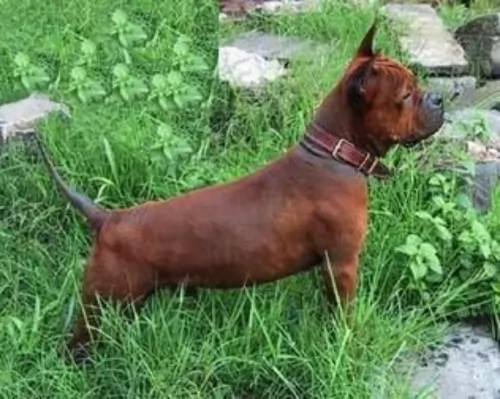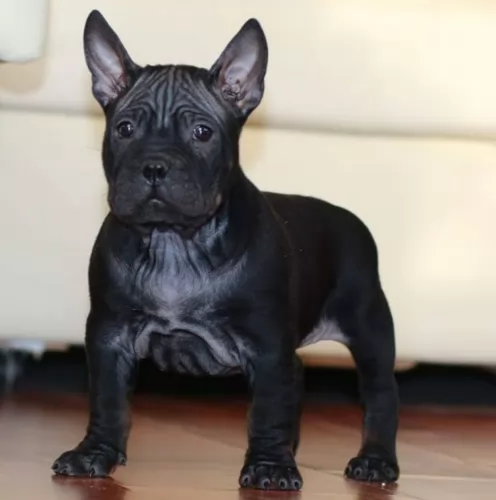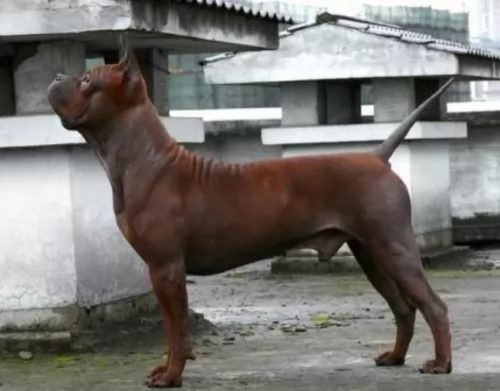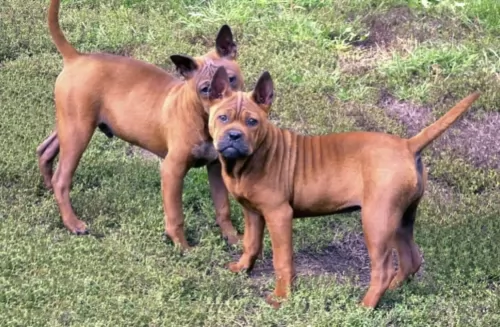 Petzlover
Petzlover Chinese Chongqing Dog is originated from China but Irish Setter is originated from Ireland. Chinese Chongqing Dog may grow 23 cm / 9 inches shorter than Irish Setter. Chinese Chongqing Dog may weigh 10 kg / 22 pounds lesser than Irish Setter. Both Chinese Chongqing Dog and Irish Setter has same life span. Chinese Chongqing Dog may have less litter size than Irish Setter. Chinese Chongqing Dog requires Low Maintenance. But Irish Setter requires Moderate Maintenance
Chinese Chongqing Dog is originated from China but Irish Setter is originated from Ireland. Chinese Chongqing Dog may grow 23 cm / 9 inches shorter than Irish Setter. Chinese Chongqing Dog may weigh 10 kg / 22 pounds lesser than Irish Setter. Both Chinese Chongqing Dog and Irish Setter has same life span. Chinese Chongqing Dog may have less litter size than Irish Setter. Chinese Chongqing Dog requires Low Maintenance. But Irish Setter requires Moderate Maintenance
 The Chinese Chongquing Dog is a very rare and unusual breed found only in China and now in Canada. The Chongquing is native to the city of Chongquing, China. This is an ancient breed that is believed to have lived in China over 2000 years ago during the Han Dynasty. It was a hunter and protector and still functions in those roles today., although there are very few left in China. Following the revolution and creation of the People’s Republic of China, the CQ Dog was only found in the rural areas of the country.
The Chinese Chongquing Dog is a very rare and unusual breed found only in China and now in Canada. The Chongquing is native to the city of Chongquing, China. This is an ancient breed that is believed to have lived in China over 2000 years ago during the Han Dynasty. It was a hunter and protector and still functions in those roles today., although there are very few left in China. Following the revolution and creation of the People’s Republic of China, the CQ Dog was only found in the rural areas of the country.
Pottery versions of the Chongquing Dog and burial figurines have been found in excavation sites from tombs of the Han Dynasty. In this isolated and mountainous area of eastern China, the dogs were unknown throughout the rest of China. Because of this the breed is relatively untouched by human intervention and is today about the same as it was 2000 years ago. There has been no interbreeding to change the natural evolution of the breed. They have their own unique personalities and temperaments.
At this time, it is believed that the Chongquing Dog is more endangered and rarer than the panda. Current breeding is diluting the breed as there are so few true bloods cross breeding and inbreeding is occurring. The knowledge of the exact breeds that contributed to the original Chongquing Dog was lost ages ago. The CQ Dog is known for loyalty, noble character, bravery and protecting its own. Today there is one kennel breeding these dogs outside China in Canada.
 The Irish Setter is a gun dog, originating in Ireland and recognized by his beautiful red or mahogany coat.
The Irish Setter is a gun dog, originating in Ireland and recognized by his beautiful red or mahogany coat.
Descending from the Setter group, the Irish Setter, also known as the Red Setter, has a solid pedigree. It was in the 1800s that they were brought to the United States.
The Irish Setter wasn't always what it looks like today and in fact the solid red color was created because of selective breeding practices. The Irish Setter has long medium length floppy ears, brown eyes and he is deep chested.
 This breed is not well known, even in China. However, its likeness has been found in pottery dating back to the Han Dynasty. It is now beginning to be show in select dog shows. The general appearance upon which a current standard is being developed includes:
This breed is not well known, even in China. However, its likeness has been found in pottery dating back to the Han Dynasty. It is now beginning to be show in select dog shows. The general appearance upon which a current standard is being developed includes:
The Chongquing is a medium sized, compact and square dog that is powerful, muscular and strong. He is unique in appearance, tail and coat. His head is large, broad and flat. There are wrinkles from the muzzle to the forehead between his eyes. His eyes are brown, and the rims are black. He has high set, small ears that are triangle shape. Its frame is sturdy and strong. He is very muscular, and his strength and speed are explosive.
The Chongqing Dog can be one of three sizes: small, medium and large. All are hunters, but each hunted different prey. The appearance of all three sizes are proportionally the same.
 The Irish Setter is a large dog, beautiful and elegant looking, standing at 61 to 71cm in height and weighing anything from 25 to 34kg, males and females.
The Irish Setter is a large dog, beautiful and elegant looking, standing at 61 to 71cm in height and weighing anything from 25 to 34kg, males and females.
The coat is a rich red color and is short to medium length but feathers in places such as the tail, the chest and abdomen, the legs and the tail. The head is long and lean, the ears are long and silky and the tail long and feathery.
The Irish Setter is a playful, friendly, sweet, mischievous, high energy dog who makes a superb family pet, getting on well with children in the home.
It was noticed that in about 1845, Setters in Ireland were mostly red, red and white or even a mustardy-lemon type of color, but there was preference for the solid red coloring. The breed standard for the modern Irish Setter was drawn up in Dublin by the Irish Red Setter Club and approved in 1886.
The dog was essentially bred for hunting game birds, using their excellent sense of smell to locate the bird. He is an alert, intelligent dog and will learn easily. Training and socialization will make him obedient and relaxed.
He isn't an assertive kind of breed and therefore isn't going to make the best of watchdogs. They've got such amicable, kind temperaments that they make popular therapy dogs.
 The Chongqing Dog is a confident, passionate, fearless and loyal dog. He is brave, alert, thoughtful and elegant. They make good companions for their people, but they are very wary of strangers and are ready to attack in order to protect their people. They are affectionate and loving with their people, including older children. They should never be off-leash in the company of other dogs.
The Chongqing Dog is a confident, passionate, fearless and loyal dog. He is brave, alert, thoughtful and elegant. They make good companions for their people, but they are very wary of strangers and are ready to attack in order to protect their people. They are affectionate and loving with their people, including older children. They should never be off-leash in the company of other dogs.
 Irish Setters are going to make you a wonderful pet. He has a friendly, confident disposition that makes them ideal pets for families with children who have been taught how to respect- and be kind to animals.
Irish Setters are going to make you a wonderful pet. He has a friendly, confident disposition that makes them ideal pets for families with children who have been taught how to respect- and be kind to animals.
He is a big dog, but with training and socialization he becomes well behaved and obedient. Social and outgoing, this is a dog which just loves the companionship of their human family and will require a good deal of exercise too.
Keep him well exercised, feed him good food that promotes health, give him a nice warm, dry place to sleep and he’ll fit perfectly well into your family and make a splendid pet.
 Irish Setters are quite a healthy breed but they are also prone to getting some of the common dog illnesses such as hip dysplasia, cancer, bloat and canine leukocyte adhesion deficiency.
Irish Setters are quite a healthy breed but they are also prone to getting some of the common dog illnesses such as hip dysplasia, cancer, bloat and canine leukocyte adhesion deficiency.
Known as CLAD, this is a disease of the immune system found in Irish Setters. True, it is a rare disease and affected animals show signs of skin lesions, bone disorders, anorexia and generalized lymphadenopathy.
Irish Setters can develop bloat, a life-threatening condition where the stomach distends with gas and can twist. This is known as gastric torsion and you’ll see your dog’s restlessness. He may even ‘hide away’ somewhere, lying down and drooling, while trying to vomit. This is an illness which requires immediate veterinary intervention.
 The best food for this dog is made yourself of human grade foods. Either raw or cooked yourself . This will keep their skin, teeth and coat healthy.
The best food for this dog is made yourself of human grade foods. Either raw or cooked yourself . This will keep their skin, teeth and coat healthy.
This is a really healthy breed especially due to the isolation and natural selection of their history.
He needs about 30 minutes of exercise today. He has no history of participation in canine games.
 Irish Setters are lean and muscular and an active breed. They love nothing more than to run off in wide open spaces, and if you live in the city and have a large garden, he will need to be taken on long walks. If he is a country dog, he may well run off and be gone for an hour or two before he returns home.
Irish Setters are lean and muscular and an active breed. They love nothing more than to run off in wide open spaces, and if you live in the city and have a large garden, he will need to be taken on long walks. If he is a country dog, he may well run off and be gone for an hour or two before he returns home.
They are dogs which are used to having a job to do such as hunting, so he won't do well if he is put into a small back yard and left to his own device. He is a social dog and wants to be with his human family, relying on them to include him in all their activities.
Your Irish Setters is a lean, muscular, active dog, and to keep him that way he will require a nutritious diet. If you feed him commercially manufactured kibble, make sure it is the very best quality one. It is a good idea to mix in protein such as cooked chicken, brown rice and vegetables. Some raw meat added in from time to time can be very beneficial to him too.
With your beautiful Irish Setter, it is best to avoid feeding your dog processed foods altogether. A good diet is essential for good health. Never leave your dog without a constant supply of cool, fresh water.
The Red Setter’s coat is fairly long on the body but short and smooth on the head. The coat will need to be brushed at least twice a week to prevent matting.
Trim his nails as needed, and find out how to keep his teeth healthy too with vet approved canine dog toothpaste- and brush.
Also check his long, floppy ears because it is so easy for ear infections to develop with these long-eared dogs.